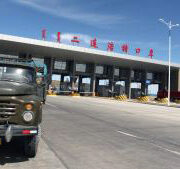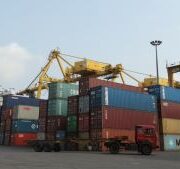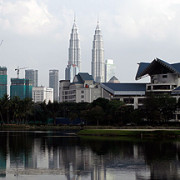Tag Archives | global value chains
Economics, Health, Industry and trade
 Economics, Governance and public sector management, Industry and trade, Private sector development
Economics, Governance and public sector management, Industry and trade, Private sector development
 Industry and trade, Regional cooperation and integration
Industry and trade, Regional cooperation and integration
 Industry and trade, Regional cooperation and integration
Industry and trade, Regional cooperation and integration
 Industry and trade
Industry and trade

Empowering Thai SMEs to join global value chains: Policy priorities under COVID-19

Small and medium-sized enterprises (SMEs) are significant contributors to economic activity and employment worldwide, and Thailand is no exception. In Thailand, SMEs represent the vast majority of firms and employ the bulk of the domestic workforce. According to the Office of SMEs Promotion (OSMEP 2019), in 2018, approximately 3 million companies were classed as SMEs in the country, comprising 99.8% of all companies. SMEs also accounted for 14 million jobs, or 86% of total employment.
SMEs in global value chains: Catalysts for dynamic and inclusive economic growth

The world has been witnessing the active construction of global value chains (GVCs) by multinational corporations (MNCs) in recent decades. According to the World Bank (2020), the share of GVC trade in world trade increased rapidly from approximately 40% in 1990 to over 50% in 2007 before declining somewhat after the global financial crisis in 2007–2008. MNCs fragment production processes into various stages and locate them in various countries and places where the particular stages can be conducted most efficiently, or at least cost, in order to achieve an efficient production system.
TPP and RCEP – friends not foes

Talks just concluded in Auckland, New Zealand on Saturday show that plans for the Regional Comprehensive Economic Partnership (RCEP) are advancing. Just as both Hillary Clinton and Donald Trump, the next potential leaders of the Trans-Pacific Partnership’s (TPP) biggest partner—the US—have distanced themselves from the agreement. Some even suggest that the US Congress won’t ratify the TPP agreement, and warn that the world economy risks US isolationism.
RCEP – a life raft for trade liberalization in Asia

There seems to be a pushback against trade agreements in the post global financial crisis era. The Trans-Pacific Partnership (TPP) was signed in early 2016, but US presidential candidates have spared no effort criticizing it so near-term ratification is highly uncertain. The WTO Doha Round is in the deep freeze after 14 years of negotiations. Unilateral trade liberalization has virtually come to a standstill.
SME internationalization through global value chains and free trade agreements: Malaysian evidence

Regionalism in Asia led by global value chains (GVCs) and free trade agreements (FTAs) has increasingly put the spotlight on small and medium-sized enterprises (SMEs). As one of Asia’s success stories in internationalization, Malaysia offers interesting insights. Drawing on research on Malaysian enterprises, this article examines the characteristics of SMEs which have successfully internationalized by participating in GVCs and FTAs and explores their policy implications. It seeks to improve our understanding of the internationalization of SMEs in Asia and contribute to the scant literature.


Search
Subscribe / Connect to Asia Pathways
Subjects
- Accelerating Progress in Gender Equality
- Addressing Remaining Poverty and Reducing Inequality
- Agriculture and natural resources
- Capacity development
- Climate change
- Economics
- Education
- Energy
- Environment
- Finance and Innovation
- Finance sector development
- Gender
- Globalization and Economic Stability
- Governance and public sector management
- Health
- Industry and trade
- Information and Communications Technology
- Infrastructure
- Making Cities More Livable
- Miscellaneous
- Population
- Poverty
- Private sector development
- Regional cooperation and integration
- Sanitation
- Social development and protection
- Strengthening Governance and Institutional Capacity
- Subjects
- Transport
- Uncategorized
- Urban development
- Video Blog
- Water
Recent Posts
- From Crisis to Resilience: The Evolution of the Banking Sector in Asia and the Pacific
- Tariffs on the Table: What Could Be Asia’s Next Move?
- Investing in Childcare a Win for Women and the Economy
- Flush and Flourish: Upgraded Toilets Can Transform Lives in Rural Asia
- New Ways for Climate Finance and Development in Asia and the Pacific




Recent Comments